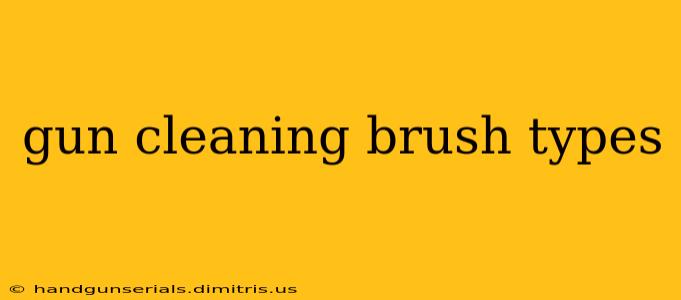Maintaining your firearm's cleanliness is crucial for its longevity, accuracy, and safe operation. A key component of any gun cleaning kit is the cleaning brush, and understanding the different types available is essential for effective cleaning and maintenance. This comprehensive guide will explore the various gun cleaning brush types, their applications, and how to choose the right one for your specific firearm.
Types of Gun Cleaning Brushes
Gun cleaning brushes come in a variety of materials, sizes, and styles, each designed for specific applications and calibers. Choosing the wrong brush can damage your firearm, so selecting the appropriate type is paramount.
1. Bronze Brushes
Bronze brushes are a popular choice for cleaning the bore of firearms. The bronze bristles are relatively soft, making them less likely to scratch the barrel's rifling compared to stiffer materials. They are effective at removing fouling and residue, especially lead and powder residue. However, they are not as durable as some other materials and may require more frequent replacement. Bronze brushes are widely available for a variety of calibers.
2. Nylon Brushes
Nylon brushes are gentler than bronze brushes, making them suitable for cleaning delicate firearms or those with a more sensitive finish. They are less abrasive and are a good option for regular cleaning to remove light fouling. While effective for light cleaning, they may not be as effective at removing stubborn deposits as bronze or other more aggressive brush types.
3. Brass Brushes
Similar to bronze, brass brushes offer good cleaning power and are less abrasive than steel. They are a robust option for heavier cleaning tasks. Their hardness sits between bronze and steel, offering a balance of effectiveness and gentleness.
4. Steel Brushes
Steel brushes are the most aggressive type of cleaning brush. They are designed for heavy-duty cleaning and removing stubborn fouling or rust. However, they are also the most likely to damage the barrel's rifling if used improperly or excessively. Steel brushes should be used sparingly and only when necessary. They are generally not recommended for regular cleaning.
5. Bore Brushes
Bore brushes are specifically designed for cleaning the barrel of a firearm. They are available in various calibers to match the specific bore size of your weapon. It is crucial to use a bore brush that precisely matches your firearm's caliber to avoid damage to the barrel. The handle often features a threaded end to allow for attachment to cleaning rods.
6. Patch Brushes
Patch brushes are smaller brushes designed to hold cleaning patches. They work in conjunction with cleaning rods and patches to scrub the bore effectively. They are used after the initial bore cleaning with a bore brush to polish the barrel and remove any remaining residue.
7. Chamber Brushes
Chamber brushes are specifically designed for cleaning the firearm's chamber. The chamber is a critical part of the firearm, and keeping it clean is vital for reliable function. Chamber brushes are often smaller and have a different shape compared to bore brushes, allowing them to reach and clean all areas within the chamber effectively.
Choosing the Right Gun Cleaning Brush
The choice of gun cleaning brush depends on several factors:
- Firearm Type: Delicate firearms may require gentler brushes (nylon), while those used in more demanding conditions may benefit from more aggressive brushes (bronze or brass).
- Caliber: The brush must precisely fit the bore diameter of your firearm. Using the wrong size can damage the barrel.
- Cleaning Needs: Regular cleaning may only require a nylon or bronze brush, while heavy fouling may necessitate a brass or steel brush (used sparingly).
Maintaining Your Gun Cleaning Brushes
Proper care of your cleaning brushes extends their lifespan and ensures their effectiveness. After each use, thoroughly clean your brushes to remove any residue. Store them in a dry place to prevent rust or corrosion.
This comprehensive guide provides a foundational understanding of the different types of gun cleaning brushes. Remember, safety and proper maintenance are paramount when cleaning your firearms. Always consult your firearm's manual for specific cleaning instructions.

